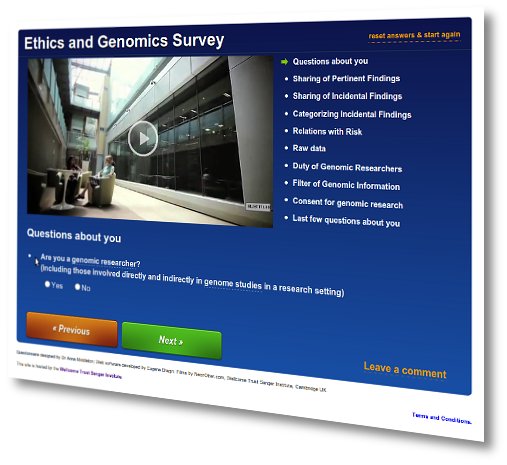Wanted: your views on genetics

The world’s largest survey on public attitudes to genetics feels it simply isn’t big enough. What it wants is more people and what it really wants is more ‘ordinary people’.
With more than 3000 people taking part to date, genomethics already leads the world. But the organiser, social scientist Dr Anna Middleton, wants more views from Jo Public, from young people, from old folks, from mums and dads.
New developments in genetics are already here. The UK Government announced at the end of 2012 that it would decode the genome of 100,000 patients in the National Health Service; meanwhile companies already offer services to the public to decode genomes for themselves or for their children.
What is lacking is a clear view of public attitudes to the use of genomic information. The survey is the leading resource to collect those views.
“Our survey helps people to learn about what is happening and gives them a tool to think through how they want to make this work for them. It also gives them a voice that will have a direct impact on policy. If people use health services already armed with some background information about genetics, together with some informed opinions, then they will be at a massive advantage.”
Dr Anna Middleton Ethics Researcher at the Wellcome Trust Sanger Institute
The survey has collected the views of more than 3000 people from countries as widely spread as Brazil, New Zealand, Finland, US and Russia. About half of the people who have completed the survey are not specialists in healthcare or genetics. To avoid influencing people taking part, the detailed findings cannot be released until the survey concludes later this year.
“Our growing understanding of genomics is already starting to improve medicine, while also creating new challenges for our healthcare systems and wider society. If we are to address these ethical, social and legal issues effectively, we need to know what people think about them, and the genomethics survey will help us to find out.
“The results of this survey will make important contributions to decision making to maximise the benefits of genomics in healthcare.”
Mark Henderson Head of Communications at the Wellcome Trust and author of 50 Genetics Ideas You Really Need to Know
For many years, the standard practice has been that genetic research is carried out anonymously – the participants are not identified – and the findings of the studies are not shared with the research participants who provided the samples. However, there is now increasing pressure to change this approach.
“I took the survey about a year ago and it stimulated my thinking around the ethics of genomic studies. Health professionals need to know what the ‘typical’ person thinks and feels as genomics start to appear in the NHS.
“Our views should be heard and everyone should think about these issues and fill out this survey.”
Katrina Evans Mother of a child with developmental delay who is participating in a whole genome study
National governments are developing systems within their healthcare provision to decode genomes from patients and to manage the flow of information from these studies. The UK has been a leader in examining how genomics might improve healthcare and how best the benefits can be delivered.
“Realising the value of genomics for medicine is a key part of our health strategy. Initiatives such as this survey will help us to ensure we deliver the benefits most sought after by the public. I will consider these findings carefully as part of my role to oversee the patient’s interests around privacy and data access in the Prime Minister’s initiative to sequence 100,000 genomes from NHS patients.”
Dame Sally Davies Chief Medical Officer for England
The survey can be found at: https://survey.sanger.ac.uk/genomethics/ and www.genomethics.org
More information
Selected websites
The Wellcome Trust Sanger Institute
The Wellcome Trust Sanger Institute is one of the world’s leading genome centres. Through its ability to conduct research at scale, it is able to engage in bold and long-term exploratory projects that are designed to influence and empower medical science globally. Institute research findings, generated through its own research programmes and through its leading role in international consortia, are being used to develop new diagnostics and treatments for human disease.
The Wellcome Trust
The Wellcome Trust is a global charitable foundation dedicated to achieving extraordinary improvements in human and animal health. We support the brightest minds in biomedical research and the medical humanities. Our breadth of support includes public engagement, education and the application of research to improve health. We are independent of both political and commercial interests.


